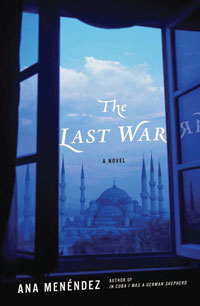War, What Is It Good For?

Ana Menéndez, (Loving Che) a former columnist/reporter for the Miami Herald has written, variously, about Cuba, Kashmir, Afghanistan, Istanbul, and India, her base for three years. With her new opus, The Last War (HarperCollins), she has authored two novels (in addition to a story collection).
Set in Istanbul, The Last War ranges temporally and geographically between Iraq and Afghanistan and India. Flash, a freelance photojournalist who frequently works with her war-reporting husband Brando, is laying over in Istanbul and mulling over joining him in Iraq. Apparently, not possessing an upbeat worldview as she wanders the streets, things quickly turn darker when Flash receives an anonymous letter from Iraq alleging her husband has been unfaithful. Though regularly speaking with Brando, she is unable to confront him with the allegations. As this plays itself out--and Flash continues to haunt the compelling streets of Istanbul, trying to reach a decision about her future and come to an accommodation about her past--enter Alexandra, a colleague from the past (Afghanistan) whose presence pries the lid off Flash's tightly boxed self-consciousness.
The coloration of this dyspeptic novel (Flash is smart, questioning, and perceptive) is foretold by the The Last War's epigram, which quotes Gay Talese: "Most journalists are restless voyeurs who see the warts on the world, the imperfections in people and places. Gloom is their game, the spectacle their passion, normalcy their nemesis." (She might have quoted my favorite Talese observation: "The real problem is what to do with the problem-solvers after the problems are solved.")
Late in the novel, Flash relates:
